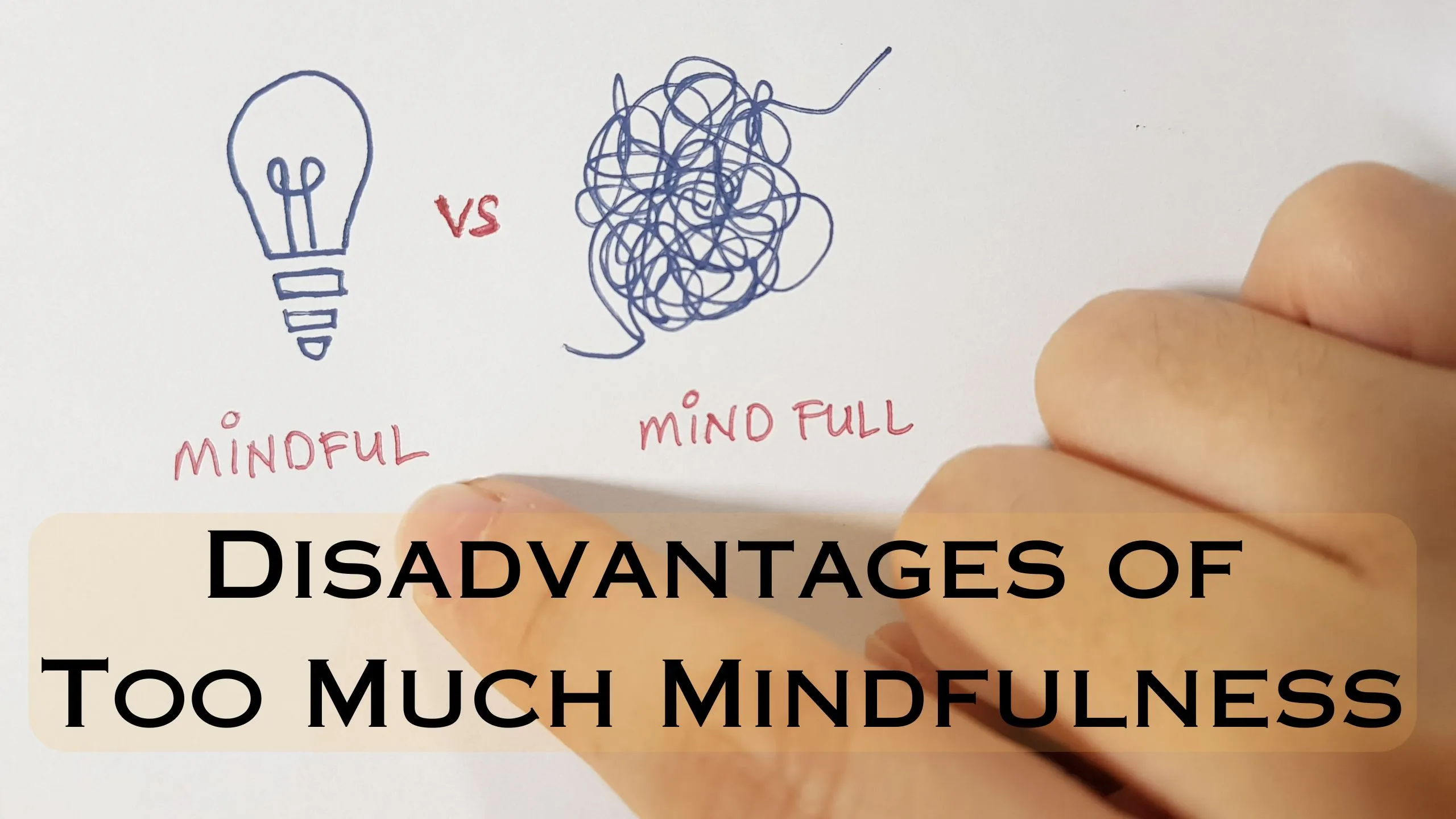“Mindfulness brings peace—until it brings too much.”
Introduction
Disadvantages of Too Much Mindfulness—it’s a phrase that might surprise many, especially in a world that often promotes mindfulness as the ultimate answer to achieving inner calm. Yet, there is a point where mindfulness can shift from beneficial to burdensome.
Mindfulness side effects can quietly disrupt our mental peace, creating hidden mindfulness drawbacks that, if left unchecked, can affect our emotional stability, relationships, and even productivity.
Are we unknowingly crossing the line from mindful presence to mindfulness overkill? Excessive mindfulness practices, which you should avoid, can be hard to identify. They often make us hyper-aware and anxious, defeating the original purpose of mindfulness.
Let’s delve into six shocking disadvantages of excessive mindfulness that might disturb your peace and explore how a balanced approach can help you keep the positives without veering into the negatives.
Read also: 10 Daily Habits for a Blissful Mind and Stress-Free Life
Disadvantages of Too Much Mindfulness
1. Emotional Numbness from Over-Focus
When mindfulness practice becomes a constant state of observation, it may create a barrier between us and our emotions. By overanalyzing our feelings, we risk becoming emotionally detached and experiencing numbness rather than clarity.
The Problem with Emotional Numbness
Emotional numbness can occur when excessive mindfulness suppresses natural responses, resulting in a lack of genuine emotion in situations where we’d otherwise feel deeply connected.
2. Hyperawareness Leading to Anxiety
While mindfulness encourages awareness, hyper-awareness can increase anxiety, pushing our minds into an exhaustive cycle of observation and analysis. Instead of finding peace, we may end up in a mental loop of constant scrutiny.
The Anxiety of Hyperawareness
This mindfulness drawback can feel exhausting, especially when focused on every minute thought or feeling, leading to self-imposed pressure.
Read also: Identifying High-Functioning Anxiety – 5 Alarming Threats
3. Neglecting Long-Term Goals for Present Moment Thinking
Mindfulness teaches us to embrace the present, but focusing excessively on the present can sometimes mean losing sight of long-term objectives, creating disadvantages of excessive mindfulness for career, personal growth, and future planning.
Losing Sight of the Bigger Picture
An intense focus on the present can lead to stagnation, where future aspirations seem unimportant or trivial. This side effect can impact our professional and personal development, causing a lack of drive or purpose.
4. Impacts on Social Connections and Relationships
In moderation, mindfulness helps us become better listeners and more empathetic partners, but too much mindfulness can hinder social interactions. By constantly tuning into ourselves, we might struggle to truly connect with others.
Strained Social Dynamics
This mindfulness drawback becomes evident when we prioritize our internal calm over shared experiences or interactions. Instead of engaging fully, we may unintentionally distance ourselves from family, friends, and colleagues, weakening bonds and reducing social satisfaction.

5. Decrease in Productive Routines
Mindfulness encourages slowing down, which can be refreshing. However, excessive mindfulness practices, which you should avoid, often lead to sluggishness, creating habits that disrupt our normal productivity levels.
From Peaceful to Unproductive
While slowing down can have benefits, constant slowness affects our ability to meet daily demands. Excessive mindfulness can make even routine tasks feel burdensome, diminishing overall efficiency and motivation.
6. Physical Manifestations of Excessive Mindfulness
Practicing excessive mindfulness over time can cause physical tension, lethargy, and mental fatigue. These mindfulness side effects highlight the need for a balanced approach that nurtures the body and mind without causing stress.
The Physical Costs of Mental Strain
Mindfulness, if overdone, can heighten our awareness of minor discomforts, leading to tension. Constant self-observation can trigger headaches, muscle stiffness, and an overall lack of energy, proving that mindfulness should be part of a holistic approach to health, not the whole approach.
Read also: Embracing Change: 6 Inspiring Steps to Build a Growth Mindset
Disadvantages of Too Much Mindfulness:
| Disadvantage | Description |
| Emotional Numbness | Over-focusing on emotions can lead to emotional detachment, resulting in numbness instead of the clarity mindfulness aims to achieve. |
| Increased Anxiety from Hyperawareness | Constant observation of thoughts and feelings can create hyper-awareness, which may heighten anxiety instead of promoting calmness. |
| Neglect of Long-Term Goals | Excessive present-moment focus can make future planning seem unimportant, impacting personal and professional growth. |
| Social Disconnect | Focusing inwardly too often can hinder genuine connection with others, creating emotional distance in relationships. |
| Reduced Productivity | Slowing down too much may disrupt productive routines, leading to a lack of motivation and diminished efficiency in daily tasks. |
| Physical Symptoms | Heightened self-observation can lead to physical tension, headaches, and fatigue as mindfulness becomes mentally and physically taxing. |
How to Avoid the Disadvantages of Too Much Mindfulness
To avoid the disadvantages of too much mindfulness:
- Set Mindful Time Limits – Practice mindfulness within defined periods to prevent mindfulness side effects like emotional numbness.
- Balance Awareness with Relaxation – Combine mindfulness with relaxation exercises to avoid increased anxiety from hyperawareness.
- Incorporate Future Planning – Complement mindfulness with goal-setting sessions to avoid neglecting long-term aspirations.
- Engage in Social Interactions – Balance inward focus with meaningful interactions to prevent social disconnect.
- Structure Daily Routines – Alternate mindfulness and productivity-focused activities to maintain energy and efficiency.
- Stay Physically Active – Include physical movement to counteract physical symptoms like tension and fatigue from excessive mindfulness practices.

These balanced practices help you embrace mindfulness without the drawbacks of excessive mindfulness, maintaining peace and productivity.
Read also: 8 Unbelievable Benefits of Good Sleep That Prevent Aging
Key Takeaway
While mindfulness can help us achieve a balanced life, too much focus can ironically unbalance us. By recognizing these disadvantages of excessive mindfulness, we can find a sustainable way to practice mindfulness that brings calm, productivity, and social connection without compromising our peace.
Conclusion
In exploring the disadvantages of too much mindfulness, we see that balance is key. Mindfulness side effects are real, and acknowledging them helps us navigate this practice with a mindful approach that doesn’t overstep its bounds.
By integrating mindfulness in moderation, we can harness its strengths while avoiding pitfalls that may disturb our mental peace and overall well-being.
While it’s beneficial to center ourselves in the present, an over-focus can cloud our vision of the future. In balancing mindfulness with the rest of our lives, we can enjoy the true rewards of this practice: peace, clarity, and a mindful approach that feels light instead of limiting.
FAQs
1. What are the main disadvantages of too much mindfulness?
The main disadvantages include emotional numbness, increased anxiety, neglect of future goals, social disconnect, reduced productivity, and physical strain.
2. Can excessive mindfulness affect mental health?
Yes, excessive mindfulness may heighten anxiety and emotional detachment, impacting overall mental well-being.
3. Is there a way to practice mindfulness without overdoing it?
Setting specific times for mindfulness and balancing it with future planning can help prevent mindfulness drawbacks.
4. How does too much mindfulness impact social relationships?
It can lead to emotional detachment, making it harder to connect authentically with others.
5. Why does mindfulness sometimes make people anxious?
Over-focusing on thoughts and emotions can create a hyper-awareness that triggers anxiety instead of calm.
6. What physical symptoms can result from too much mindfulness?
Headaches, muscle tension, and fatigue can emerge from the constant self-observation involved in excessive mindfulness practices.







One thought on “6 Shocking Disadvantages of Too Much Mindfulness Affecting Your Peace”